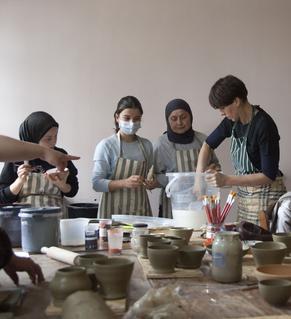Profile
- Name of diaspora organisation:
Georgische Migrantinnen und Migranten e.V. (GeMi)
- Main location of the organisation:
Hannover, Germany
- Websites:
- Name of partner organisation:
Kakheti Regional Development Foundation (KRDF)
- Location of partner organisation:
Pankisi Valley in Kakheti on the Georgian-Russian border
- Website:
- Websites of the depicted project:

Implementing projects like this in our country of origin is deeply fulfilling. It also benefits our organisation and its members by providing new experiences and enhancing our expertise. This particular project in eastern Georgia has opened new opportunities for us, expanded our network and increased our understanding.The Pankisi Valley in Kakheti is home to the Kist people, an ethnic minority with a strong Islamic faith. The traditional lifestyle of Kist women often results in social and economic disadvantages. To address this, GeMi collaborated with the Kakheti Regional Development Foundation (KRDF) to provide practical training in ceramic production and marketing to these women.
The training sessions were held at a community centre equipped with a ceramic workshop. The project also involved two additional partners: an experienced ceramic production trainer and a business trainer specialising in practical skills for women, such as product branding, financial literacy, and sales. Apart from the Kist women, multipliers like employees of the community centre and art teachers from local schools also received training in pottery production.With the techniques that they learned, the women designed creative pieces of pottery, such as soap dishes, decorative tiles, saltshakers and spoons. The team launched a website and established connections with various markets, stores, and hotels in and around Tbilisi to raise awareness and create sales opportunities. The ceramic workshops and the website continue to operate successfully.
Almost all 15 Kist women I worked with in this project were deeply affected by the loss of their sons in the Syria war. Seeing these mothers gain self-confidence, pride, and joy as they sold their handmade products at a market in Tbilisi was profoundly moving. When the German embassy offered to finance a larger kiln in recognition of this project, I was immensely moved.
Further information on the offers available to the Georgian diaspora can be found below.